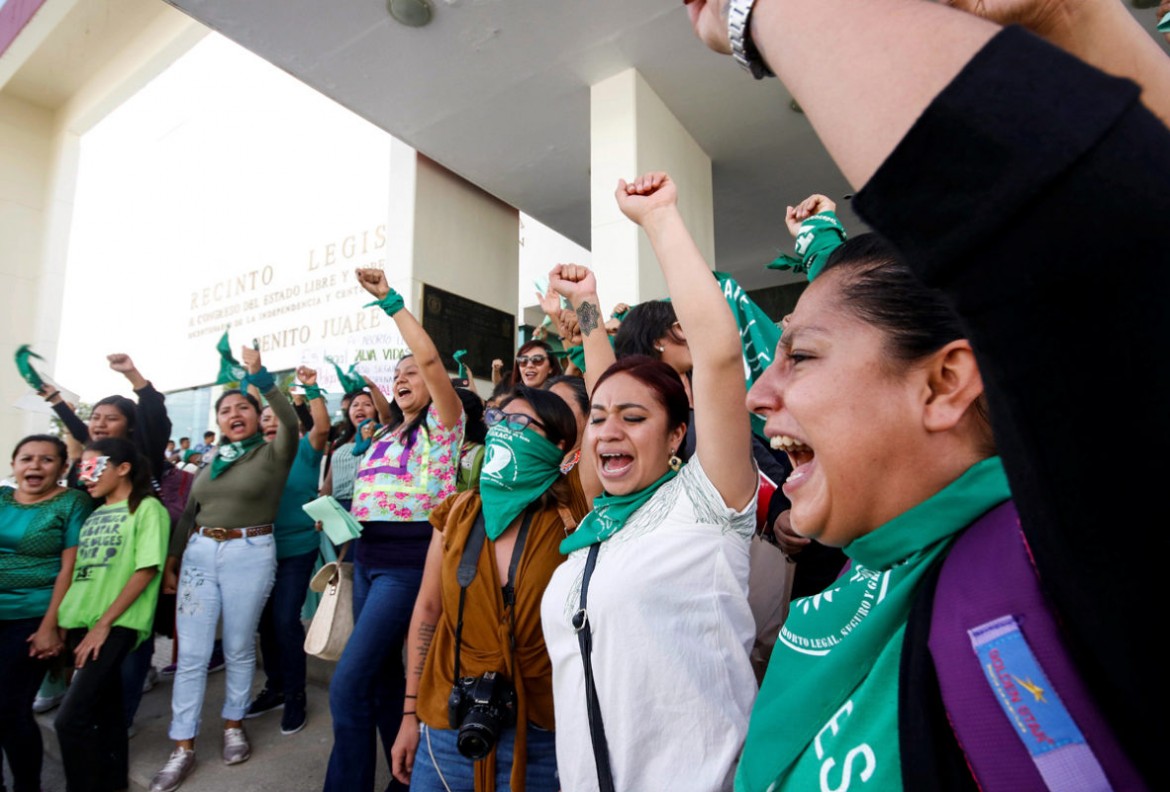Reportage
The feminist vanguard of Mexico
After the historic vote in which Oaxaca state decriminalized abortion, a great victory for the rights of poor women, across the country women are rising up in a ‘green tide.’

“It may sound incredible, but the feminists in the state of Oaxaca are the vanguard of a green tide that I hope will spread throughout Mexico.” Elena, 40, a lawyer, is a member of the Grupo de Informacion en Reproducíon Elegida (GIRE), and she is talking about the “historic” vote that took place on Sept. 26, when the Congress of the Mexican state of Oaxaca voted to decriminalize abortion (by 24 in favor to 12 against).
“It is one of the Mexican states with the worst educational attainment levels, with high marginalization and poverty rates (23% of the population are living in extreme poverty) and with more than 400 indigenous municipalities, a region where women’s rights have never been treated as a priority for many years,” Elena explains. “Now, it is becoming a green state, a reference point for the feminist struggle in the country, but also in all of Latin America.” I meet Elena in the tourist area of Cancún; from here, the events taking place in Oaxaca seem very far away. Here, women’s bodies are first and foremost a necessity for all kinds of advertising aimed at attracting tourists. In the local establishments, such as the one right in front of the ice cream shop where we meet, there is a constant parade of young girls dancing in skimpy outfits.
This is where the Cancún cartel is laundering the money that comes from drugs, gambling and prostitution. It is difficult to promote feminist speech and a feminist struggle here, Elena admits. “However, we organized a protest here in support of legal abortion on Sept. 28. We joined the Grito Global launched by the Argentinian feminists, who won a great victory in their country this year.”
Here, in the Quintana Roo state, like in the rest of Mexico—with the exception of Mexico City and the latest addition, Oaxaca—abortion is only legal in cases of rape; otherwise, it is a crime punishable by six months to two years in prison. “It is possible to get approval to terminate a pregnancy for other reasons, such as a risk to life or health or socio-economic reasons,” Elena explains. “But, of course, this possibility is only open to people with money. It’s certainly not available for the Maya population, relegated to the bottom of society. There are only very approximate estimates available for the number of clandestine abortions. We at GIRE estimate that abortion is the third leading cause of maternal death.”
On Sept. 16, President Andrés Manuel López Obrador, as part of the reforms he has been promoting since taking office on Dec. 1 last year, sent a draft bill to the Chamber of Deputies which would offer amnesty for women who are in prison because of abortions. However, as Elena explains, this would be a federal law, and thus would only help women who have been charged at the federal level.
GIRE’s official statement celebrating the Oaxaca vote says: “The decriminalization of abortion in Oaxaca is an act of social justice that expands the freedom and protects the life and health of women living in one of the areas with the greatest social inequality gaps.”
“We are fighting so that this act of justice would also be extended to our state, Quintana Roo,” Elena says. With this goal in mind, she went together with other militants to see how they do things at the Casa Libertad para las Mujeres in Oaxaca.
As was to be expected, both in Cancún and in Oaxaca (as elsewhere), the Catholic Church has put out highly critical statements against the decision taken by the Oaxaca Congress. A statement released by the Mexican Bishops’ Conference says that the decriminalization of abortion will cause “serious moral deterioration.” Elena recounts her experiences so far in this unequal battle: “Together with other civil organizations—Marea Verde-Quintana Roo and Derechos Autonomías y Sexualidades—we presented, through the Citizens’ Participation Law, a proposal for the decriminalization of abortion, but it ended up buried in one of Congress’s committees. After the resounding victory in Oaxaca, we will bring the fight here once again.”
Originally published at https://ilmanifesto.it/lavanguardia-femminista-del-messico/ on 2019-10-09
